|
|
|
Sort Order |
|
|
|
Items / Page
|
|
|
|
|
|
|
| Srl | Item |
| 1 |
ID:
117915


|
|
|
|
|
| Publication |
2012.
|
| Summary/Abstract |
Pragmatism is ever more popular amongst those who study international relations. Its emphasis on practice is generally acknowledged as a defining characteristic. There is, however, a general tension within pragmatist thought concerning practice, for pragmatism may emphasize the theorizing of practice. It is, then, distinguished from other theories in International Relations (IR) such as neo-realism or constructivism as a contender in their midst. We delineate a pragmatist theory of IR in the first part of this article, but insist on going beyond merely establishing the next paradigm, for pragmatism may also emphasize the practice of theorizing. Theories are, then, considered different tools useful for dealing with the social world. This will be corroborated in the second part by a close reading of William James. Finally, we submit that instead of a paradigm war, a metaphor such as that of the Papini hotel is needed in IR - a metaphor that accounts for theory competition without neglecting the limitations set by the practice of theorizing itself.
|
|
|
|
|
|
|
|
|
|
|
|
|
|
|
|
| 2 |
ID:
117918
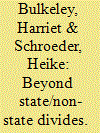

|
|
|
|
|
| Publication |
2012.
|
| Summary/Abstract |
This article challenges the assumption that the boundaries of state versus non-state and public versus private can readily be drawn. It argues that the roles of actors - as state or non-state - and the forms of authority - public or private - are not pre-given but are forged through the process of governing. Drawing on neo-Gramscian and governmentality perspectives, it suggests that a more dynamic account of the state can offer a more nuanced means of analysing the process of governing global environmental affairs. In order to understand this process and the outcomes of governing climate change, we argue that analysis should focus on the hegemonic projects and programmes through which the objects and subjects of governing are constituted and contested, and through which the form and nature of the state and authority are accomplished. We suggest that this is a process achieved and held in place through 'forging alignment' between diverse social and material entities in order to achieve the 'right disposition of things' through which the will to govern climate change can be realized (Murray Li, 2007a). We illustrate this argument by examining the governing of climate change in two global cities, London and Los Angeles.
|
|
|
|
|
|
|
|
|
|
|
|
|
|
|
|
| 3 |
ID:
117913
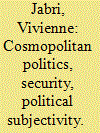

|
|
|
|
|
| Publication |
2012.
|
| Summary/Abstract |
Conventionally, the concept of cosmopolitanism is dealt with as a normative discourse. However, a far more useful understanding is to focus on the practices that the concept enables. The aim in this article is to highlight two manifestations of such practices, namely those that have as their imperative security, the cosmopolitanism of government, and those that might be defined in terms of solidarity, the cosmopolitanism of politics. Both the socio-historical context of the rise of liberal modernity as well as its late-modern manifestations in contemporary security practices suggest that these two articulations of cosmopolitanism should not be seen in oppositional terms, but rather as being mutually implicating and mutually present. While the concept enables a government of populations, containing within it a colonial rationality, the article suggests that there is an excess to the concept that steers it beyond government through security and towards the politics of solidarity. Placing the lens on the forms of political subjectivity generated through cosmopolitan practices, the article highlights the concept's potential in revealing the political implications of contemporary practices that have the postcolonial world as the primary target of their operations.
|
|
|
|
|
|
|
|
|
|
|
|
|
|
|
|
| 4 |
ID:
117912
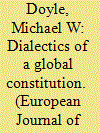

|
|
|
|
|
| Publication |
2012.
|
| Summary/Abstract |
As a decentralized legal order, the international system arguably has no single constitution, but the closest candidate to a constitution that it does have is the UN Charter. Thus it is worth exploring how constitutional the Charter is in theory and practice. Sixty-plus years into its evolution we can see two dominant features. First, its key constitutional elements are: supranationality in its various forms; inequality; and, like all constitutions, an 'invitation to struggle' that leads to inevitable pushback from states when UN authority expands. Second, unlike in many domestic constitutions, the pushback more than holds its own. The UN has neither integrated its parts nor centralized authority. To illustrate those points, I start with a comparison of the UN Charter to both capital 'C' domestic constitutions and to ordinary treaties. I then address with a broad brush the main features of the UN's supranationality and inequality. The Secretariat and its neutrality and independence are the next topics. I then consider two examples of tension between UN supranationality and sovereignty. I explore the trend toward 'global legislation' associated with the Security Council's counter-terrorist resolutions, 1373 and 1540. I then focus on the example of the Millennium Development Goals, the UN's recent attempt to remake itself as a development body. I conclude with a discussion of the wider constitutional significance and prospects of the UN in the light of the contrasting success of the history of US federalism and European integration.
|
|
|
|
|
|
|
|
|
|
|
|
|
|
|
|
| 5 |
ID:
117914
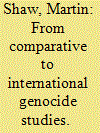

|
|
|
|
|
| Publication |
2012.
|
| Summary/Abstract |
Genocide is widely seen as a phenomenon of domestic politics, which becomes of international significance because it offends against international law. Hence there are as yet inadequate International Relations analyses of the production of genocide. This article challenges the idea of the domestic genesis of genocide, and critiques the corresponding approach of 'comparative genocide studies' which is dominant in the field. It analyses the emergence of more fruitful 'relational' and 'international' approaches in critical genocide studies, while identifying the limitations of their accounts of the 'international system'. As first steps towards an adequate international account, the article then explores questions of the international meaning and construction of genocidal relations, and of international relations as the context of genocide. It argues for a historical and sociological approach to the international relations of genocide, and examines 20th-century European genocide in this light. Arguing for a broader conception of this historical experience than is suggested by an exclusive focus on the Holocaust, the article offers an interpretation of genocide as increasingly endemic and systemic in international relations in the first half of the century. It concludes by arguing that this account offers a starting point, but not a model, for analyses of genocide in global international relations in the 21st century.
|
|
|
|
|
|
|
|
|
|
|
|
|
|
|
|
| 6 |
ID:
117916
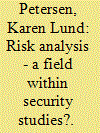

|
|
|
|
|
| Publication |
2012.
|
| Summary/Abstract |
The academic environments of risk analysis and security studies had hardly 'spoken' to one another until recently. The two fields of study were defined within different academic disciplines: security studies a matter for International Relations (IR), and risk studies a matter for sociology, economics and the natural sciences. Increased focus on catastrophic events (terrorism, climate change, etc.) seems to have given the fields of security studies and risk analysis a common empirical theme and highlighted the need for a common research agenda. This article explores the intersection between these two fields of study, as it investigates how the 'old' disciplinary debates on risk have been translated 'into' security studies - to predict, criticize or evaluate the current political practice of security. Such analysis provides a much-needed overview of the risk debates within security studies and brings out the limits of this debate in light of the broader and much more historically settled risk debates within sociology, economics and anthropology.
|
|
|
|
|
|
|
|
|
|
|
|
|
|
|
|
| 7 |
ID:
117917
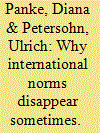

|
|
|
|
|
| Publication |
2012.
|
| Summary/Abstract |
This article addresses the empirical puzzle as to why some formerly deeply embedded international norms either incrementally or rapidly lose their prescriptive status and, in the extreme, can even cease to exist. Why is it that some norms are replaced while others simply disappear? The IR literature has rich explanations for norm creation, diffusion and socialization, yet there is a theoretical and empirical gap on both the dynamics and scope conditions for the degeneration of international norms. Thus, we develop hypotheses on processes and outcomes of norm disappearances that are tested with a series of qualitative studies. Norm degenerations require the presence of actors who challenge the norm and the absence of central enforcement authorities or individual states that are willing and capable of punishing norm violations. Moreover, our study shows that norms are likely to be abolished swiftly if the environment is unstable and rapidly changing and if norms are highly precise. In contrast, norms are likely to become incrementally degenerated if the environment is relatively stable and if norms are imprecise. Both processes lead to norm substitutions, provided that competing norms are present. If rival norms are absent, norms simply disappear without being replaced.
|
|
|
|
|
|
|
|
|
|
|
|
|
|
|
|
|
|
|
|
|